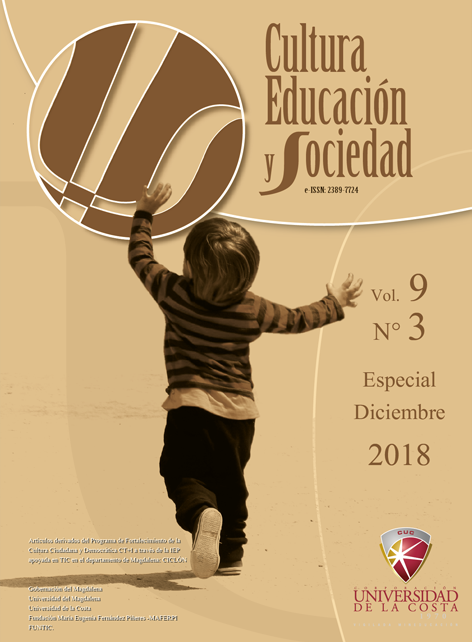The ludic mediated by ICT a strategy for teaching and promoting values.
DOI:
https://doi.org/10.17981/cultedusoc.9.3.2018.55Keywords:
Information and communication technologies, games, values.Abstract
This article shows the results derived from the study la lúdica mediated by TIC a strategy for the teaching and promotion of values in students of the I.E.D. José de la Paz Vanegas, headquarters ERM Antonio Nariño, located in the village of El Cerrito, department of Magdalena. The study addresses a qualitative approach, where it is described how through the ludic mediated by ICT students appropriate conceptual and practical elements of values. the interviewing technique was used as techniques, seeking to collect information at various levels: sociodemographic (age, sex, educational level), parenting patterns, establishment of norms, perceived parent-child relationship, most important values in the home. shows how they perceive the values of students in the learning processes and in the recreation spaces, as well as their perception of the influence of family relationships in the development of values in children
Downloads
References
Arrieta, M. (2016). Los masones en el mundo: Geopolítica masónica. La historia de los hijos de la luz. Córdoba, España: Editorial Almuzara.
Avendaño, I. & Martínez, D. (2013). Competencia lectora y el uso de las nuevas tecnologías de la información y comunicación. Revista Escenarios, 11(1), 7-22.
Beltrán, F.; Torres, I.; Beltrán, A. y García, F. (2005). Un estudio comparativo sobre valores éticos en estudiantes universitarios. Enseñanza e Investigación en psicología, 10(2).
Castro, S.; Guzmán, B. y Casado, D. (2007). Las TIC en los procesos de enseñanza y aprendizaje. Laurus, 13(23).
Karam, J.; Buitrago, A.; Fagua, A. y Romero, Y. (2013). Estrategias de gamificación aplicadas al diagnóstico de la incorporación pedagógica de las TIC en una comunidad académica. Cultura, Educación y Sociedad 4(1), 55-74.
Kustcher N., y St.Pierre A., (2001) Pedagogía e Internet Aprovechamiento de las Nuevas Tecnologías. Editorial Trillas México DF.
Martínez, J. (2008). Desarrollo moral: su medición y sus factores determinantes en un grupo de estudiantes de grado decimo. Colombia: Universidad Sergio Arboleda.
Mendoza, D., López, D., & Salas, E. (2016). Planificación estratégica de recursos humanos: efectiva forma de identificar necesidades de personal. Económicas CUC, 37(1), 61-79.
Ochoa, R. (2015). Comportamiento Electoral de los Colombianos durante las elecciones presidenciales del año 2010. Jurídicas CUC, 11(1), 209-220. doi: http://dx.doi.org/10.17981/juridcuc.11.1.2015.9
Pabón-Gómez, J. A. (2014). Las TICs y la lúdica como herramientas facilitadoras en el aprendizaje de la matemática. Eco matemático, 5(1), 37-48.
Portillo, F. (2005). Para poder referir a la formación en valores es preciso distinguir claramente entre: principios, valores y convicciones. Disponible en: http://redalyc.uaemex.mx/redalyc/src/inicio/ArtPdfRed.jsp?i
Posada, R. (2014). La lúdica como estrategia didáctica (Doctoral dissertation, Universidad Nacional de Colombia
Ramírez Rodríguez, C. (2010), “Las TICS en el Aula”. NNTT, Granada. 2010
Restrepo, P.; Gutiérrez, S.; Caro, N. y Moreno, C. (2015). La lúdica como estrategia pedagógica para fortalecer la convivencia escolar. Lúdica Pedagógica, (21).
Sisiruca , M., & Salazar , C. (2014). Valores éticos de la responsabilidad social interna en centros de producción audiovisual. Económicas CUC, 35(1), 79-90.
Vargas Cordero, Z. R. (2004). Desarrollo moral, valores y ética; una investigación dentro del aula. Educación, 28(2).
Vielma, E. y Salas, M. (2000). Aportes de las teorías de Vygotsky, Piaget, Bandura y Bruner. Paralelismo en sus posiciones en relación con el desarrollo. Educere, 3(9).
Villalba, M., Hurtado, H., Guarín, H., & Casas, J. (2013). Innovación en pymes artesanales. Económicas CUC, 34(1), 15-28
Waichman, A. (2000). Herramientas de pensamiento. Madrid: Siglo XXI.
Downloads
Published
How to Cite
Issue
Section
License
Copyright (c) 2018 CULTURA EDUCACIÓN Y SOCIEDAD

This work is licensed under a Creative Commons Attribution-NonCommercial-NoDerivatives 4.0 International License.
![]()
Creative Commons 2020 CULTURA EDUCACIÓN Y SOCIEDAD
This article is under international license Creative Commons Reconocimiento-NoComercial-SinObrasDerivadas 4.0.
The published articles are the sole responsibility of their authors and do not necessarily reflect the opinions of the editorial committee.
CULTURA EDUCACIÓN Y SOCIEDAD respects the moral rights of its authors, who assign to the editorial committee the patrimonial rights of the published material. In turn, the authors inform that this work is unpublished and has not been previously published.
All articles are under a:
Licencia Creative Commons Atribución-NoComercial-SinDerivadas 4.0 Internacional.
![]()


 English
English
 Español (España)
Español (España)




_12.53_.27_p_. m_._3.png)





_12.57_.35_p_. m_._3.png)
_12.50_.37_p_. m_._3.png)



